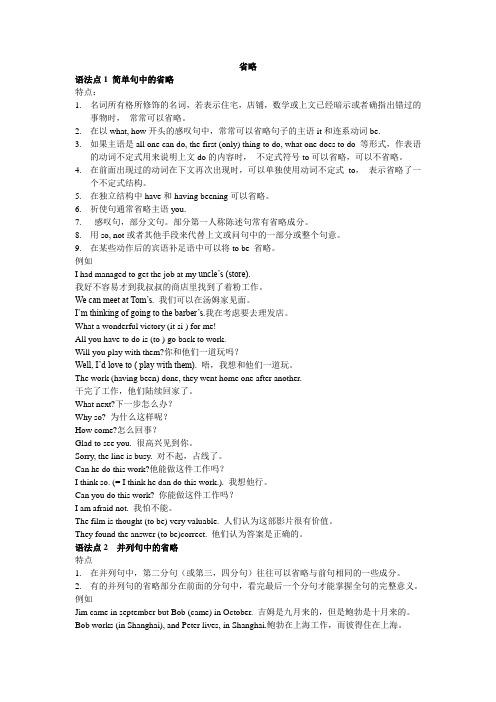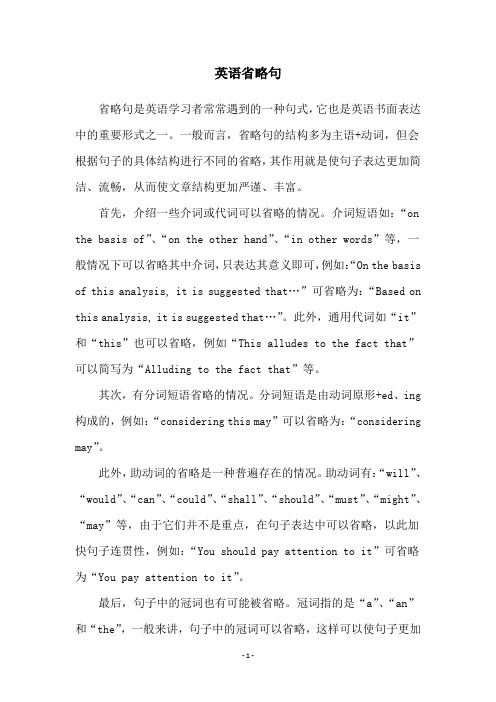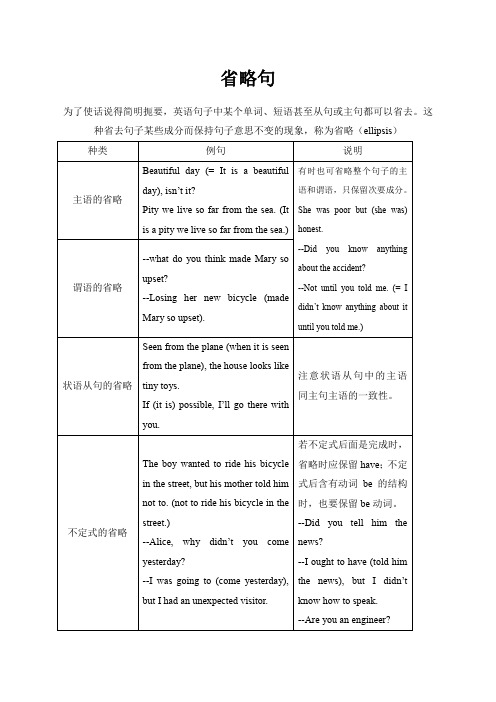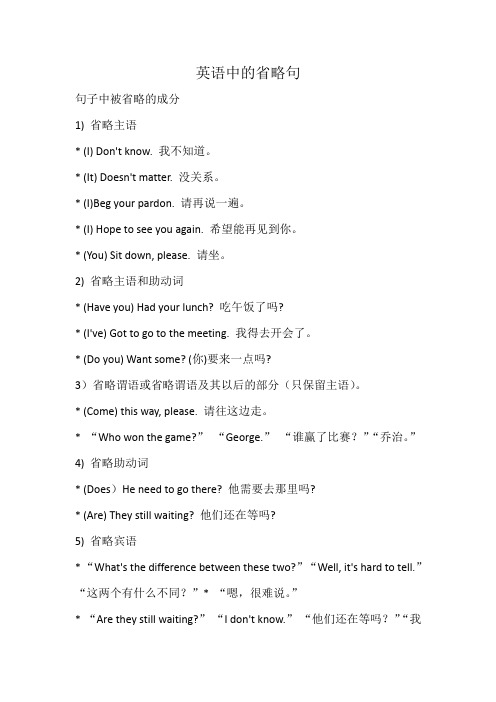英语省略句型
高中省略句

省略语法点1 简单句中的省略特点:1.名词所有格所修饰的名词,若表示住宅,店铺,数学或上文已经暗示或者确指出错过的事物时,常常可以省略。
2.在以what, how开头的感叹句中,常常可以省略句子的主语it和连系动词be.3.如果主语是all one can do, the first (only) thing to do, what one does to do 等形式,作表语的动词不定式用来说明上文do的内容时,不定式符号to可以省略,可以不省略。
4.在前面出现过的动词在下文再次出现时,可以单独使用动词不定式to,表示省略了一个不定式结构。
5.在独立结构中have和having beening可以省略。
6.祈使句通常省略主语you.7.感叹句,部分文句。
部分第一人称陈述句常有省略成分。
8.用so, not或者其他手段来代替上文或问句中的一部分或整个句意。
9.在某些动作后的宾语补足语中可以将to be 省略。
例如I had managed to get the job at my uncle’s (store).我好不容易才到我叔叔的商店里找到了着粉工作。
We can meet at Tom’s. 我们可以在汤姆家见面。
I’m thinking of going to the barber’s.我在考虑要去理发店。
What a wonderful victory (it si ) for me!All you have to do is (to ) go back to work.Will you play with them?你和他们一道玩吗?Well, I’d love to ( play with them). 唔,我想和他们一道玩。
The work (having been) done, they went home one after another.干完了工作,他们陆续回家了。
What next?下一步怎么办?Why so? 为什么这样呢?How come?怎么回事?Glad to see you. 很高兴见到你。
高考英语语法知识点归纳总结:省略句

④Child as he is, he knows a lot.
虽然他还是一个孩子,却懂得很多
介词的省略
①both后常跟of短语,其后可以接名词复数形式,也可以接代词宾格复数形式。接复数名词时,介词of可以省略,但接代词宾格时,of不能省略。
②在现在完成时表持续和重复的句型中,一段时间前的介词for可以省略。
这双鞋穿破了,已经穿了很长一段时间了。
③Trees can prevent the earth (from) being washed away.
树能阻止泥土被冲走。
Can you stop him (from) going swimming in the river?
你能阻止他下河洗澡吗?
I have some difficulty (in) answering the question.
约翰一定在踢球,而玛丽一定在做作业。
②His suggestions made John happy, but (his suggestions made) Mary angry.
他的建议使约翰高兴,却使玛丽很生气。
③Old McDonald gave up smoking for a while, but (he) soon returned to his old ways.
有些动词,tell, ask, allow, expect, force, invite, permit, persuade, order, warn, wish, would like,forbid等后跟动词不定式作宾语补足语、主语补足语时,不定式承前省略动词原形,保留动词不定式符号to。
He didn't come, though we had invited him to (come).
英语省略句

英语省略句省略句是英语学习者常常遇到的一种句式,它也是英语书面表达中的重要形式之一。
一般而言,省略句的结构多为主语+动词,但会根据句子的具体结构进行不同的省略,其作用就是使句子表达更加简洁、流畅,从而使文章结构更加严谨、丰富。
首先,介绍一些介词或代词可以省略的情况。
介词短语如:“on the basis of”、“on the other hand”、“in other words”等,一般情况下可以省略其中介词,只表达其意义即可,例如:“On the basis of this analysis, it is suggested that…”可省略为:“Based on this analysis, it is suggested that…”。
此外,通用代词如“it”和“this”也可以省略,例如“This alludes to the fact that”可以简写为“Alluding to the fact that”等。
其次,有分词短语省略的情况。
分词短语是由动词原形+ed、ing 构成的,例如:“considering this may”可以省略为:“considering may”。
此外,助动词的省略是一种普遍存在的情况。
助动词有:“will”、“would”、“can”、“could”、“shall”、“should”、“must”、“might”、“may”等,由于它们并不是重点,在句子表达中可以省略,以此加快句子连贯性,例如:“You should pay attention to it”可省略为“You pay attention to it”。
最后,句子中的冠词也有可能被省略。
冠词指的是“a”、“an”和“the”,一般来讲,句子中的冠词可以省略,这样可以使句子更加简洁。
例如:“He took the car and drove away”可省略为“He took car and drove away”。
英语语法省略句

省略句1)不定式在love, mean, want, like, wish, expect, try, intend, plan, refuse, prefer, seem等动词后面2)在happy,glad,eager,ready,willing等形容词后面。
1.---will you join us?--- I should love to(join you).2.I asked him to see the fil m, but he didn’t want to(see the film).3.--- Would you like to go with us?--- Yes, I’m glad to(go with you)4.He doesn’t get up early as he used to. (get up)注意: 如果不定式中含有be, have(助动词), have been, 通常保留be, have(助动词), have been.1.--- Are you a sailor?--- No, but I used to be.2.---He hasn’t finished yet.---well, he ought to have.1. —I'll be away on a business trip. Would you mind looking after my cat?—Not at all, ________ . (NMET 1995)A. I have no timeB. I'd rather notC. I‘d like itD. I'd be happy to2. —Does your brother intend to study German?—Yes, he intends ________ . (NMET 1998上海卷)A. /B. toC. soD. that5.--- He hasn’t gone to the office up to now.--- Well, he _____.A. shouldB. ought toC. ought to goD. ought to have4. —You should have thanked her before you left.—I meant ________ , but when I was leaving I couldn't find her anywhere. (NMET 2000北京春招卷)A. to doB. toC. doingD. doing to替代词so / not用于避免重复前面所说过的内容。
英语中的省略句

• The problem was a continuous worry to me until it was solved. • Until solved,the problem was a continuous worry to me.
• The young man was listening to music all the time while he was working at the computer.
英语中的省略句பைடு நூலகம்
• 在时间、让步、方式、条件等状语从句中,即由 when、while、although、unless、if、as if等引导 的从句中,如果从句的主语与主句主语一致,或 者主语是it,且在谓语动词中含有be时,常省略从 句的主语和be动词。 • Be careful when(you are)crossing the street.当你 过马路的时候要小心。 • He won’t go to the party unless(he is)invited.除 非收到邀请,否则他不会参加聚会。 •
• He opened his lips as if(he were)to speak.他张开 嘴好像有话说。
• After she learned some simple Chinese,the American girl was able to communicate with the other students in her class. • After learning some simple Chinese,the American girl was able to communicate with the other students in her class.
高中英语语法省略句

省略句为了使话说得简明扼要,英语句子中某个单词、短语甚至从句或主句都可以省去。
这种省去句子某些成分而保持句子意思不变的现象,称为省略(ellipsis)Ⅰ、状语从句中的省略用法一、如果从句的主语和主句的主语一致,且从句的谓语含有be动词的某种形式(am/is/are/was/were),可同时省略从句的主语和be动词的某种形式。
1、when,while引导的时间状语从句e.g. Do be careful when (you are) crossing the street.When/While (I was) on my way to work, I met her.2、if,unless,once引导的条件状语从句e.g. If (it is) properly treated, waste will do no harm to the environment.I’ll not go to the party unless (I am) invited.Once (you are) caught stealing in a supermarket, you will be punished.3、though,although,whether,no matter whether/what/how/who等引导的让步状语从句e.g. He was happy, though/although (he was) poor.Whether (she is) sick or well, she is always cheerful.No matter how/However hard the task (is), we must fulfill it in time.(注:从句的主语和主句的主语不一致时,只省略从句中的be动词形式)4、as if,as though引导的方式状语从句e.g. He rubbed his eyes and yawned as if/though (he was) waking up after a longsleep.He stood up as if/though (he wanted) to leave.(as if/though + to do表示一个将来的动作)二、than,as引导的比较状语从句中的省略用法:当不同的主语进行比较时,一般省略从句中的谓语;当从句中的主语与谓语(be动词除外)和主句中的主语与谓语相同时,通常省略从句中的主语和谓语,只保留比较部分。
省略句完全归纳

小品词的省略(1)省略介词He spent four hours (in) going over his lessons. 他花了四个小时复习功课。
I ’ ve studied Eng1ish (for) f ive years. 我已学五年英语了。
(2)省略连词 thatI believe (that) you w ill succeed .我相信你们会成功的。
It’s a pity (that) he ’s leaving. 他要走,真遗憾。
I’m sure (that) she will help you. 我肯定她会帮你的。
(3)省略关系代词I’ll give you all (that) I have. 我要把我所有的一切都给你。
He read the book (which) I got yesterday. 他看过我昨天买的书了。
3. 句子成分的省略(1)省略主语Beg your pardon. (我)请你原谅。
(Beg 前省略了主语I)Take care! 当心!(Ta ke 前省略了主语 you )II)Looks as if it will rain. 看起来象要下雨。
(Looks 前省略了主语 it)III)(2)省略谓语Who next? 该谁了?( Who 后面省略了谓语 comes )The river was deep and the ice thin. (ice 后面省略了 was )We ’ll do the best we can. 我们将尽力而为。
(can 后面省略了动词 do )(3)省略表语Are youready? Yes, I a m.你准备好了吗?我准备好了。
(am 后面省略了ready )He was a lover of sports as he had been in his youth. 他还是象年轻时那样,是一位运动爱好者。
(had been 后面省略了 a lover of sports )(4)省略宾语Let’s do the d ishes.I’ll wash and you ’ll dry. 让我们洗碗吧,我来洗,你来揩干。
英语中的省略句

英语中的省略句句子中被省略的成分1) 省略主语* (I) Don't know. 我不知道。
* (It) Doesn't matter. 没关系。
* (I)Beg your pardon. 请再说一遍。
* (I) Hope to see you again. 希望能再见到你。
* (You) Sit down, please. 请坐。
2) 省略主语和助动词* (Have you) Had your lunch? 吃午饭了吗?* (I've) Got to go to the meeting. 我得去开会了。
* (Do you) Want some? (你)要来一点吗?3)省略谓语或省略谓语及其以后的部分(只保留主语)。
* (Come) this way, please. 请往这边走。
* “Who won the game?”“George.”“谁赢了比赛?”“乔治。
”4) 省略助动词* (Does)He need to go there? 他需要去那里吗?* (Are) They still waiting? 他们还在等吗?5) 省略宾语* “What's the difference between these two?”“Well, it's hard to tell.”“这两个有什么不同?”* “嗯,很难说。
”* “Are they still waiting?”“I don't know.”“他们还在等吗?”“我不知道。
”6)省略主语和谓语* No, there won't. 不,不会有。
* Yes, there will. 是的,将会有。
- 1、下载文档前请自行甄别文档内容的完整性,平台不提供额外的编辑、内容补充、找答案等附加服务。
- 2、"仅部分预览"的文档,不可在线预览部分如存在完整性等问题,可反馈申请退款(可完整预览的文档不适用该条件!)。
- 3、如文档侵犯您的权益,请联系客服反馈,我们会尽快为您处理(人工客服工作时间:9:00-18:30)。
She was poor but (she was) honest.
2.有时并列句中的省略部分出现在前面的分 句中,看完最后一个分句才能掌握全句的完 整意义。
并列句中的省略 1.后面分句中与前面相同的部分常被省略
Mary can (speak English)and Mary ought to speak English.
2)有时条件从句可以完全省去,只剩下主句。
3)以as,than 引导的比较状语从 句可以全部或部分省去。 After half a hour, she become quieter (than she had been.)
4)以when ,if等引导的状语从句若主句从 句主语一致而且谓语是be;或者主语是it 谓语是be,可以省去主语和be。
When (it is) heated, water can be changed into vapor.
4.表示讲话人的意见和看法
(It) sounds fine to me. (It’s a) pity you couldn’t come.
5.提问
(Is there) anything wrong? (Have you) found the bike?
6.名词所有格修饰的名词若表示店铺,住 宅,教堂或上下文已暗示或明确指出过的 事物
惯用的省略结构
1.无动词祈使句,无主句祝愿句,这类句子 往往用感叹号.
If only I could remember his name!
2.固定句型How/What about + n/pron/-ing.
What about some more milk?
3.Why not +省去to的动词不定式。
2.宾语从句中的省略
1)由which,when,where,how和why 引导的宾 语从句,可全部或部分省去,只保留引导词。
Please pass me one of these books, I don’t care which (you pass me).
2)在I’m afraid,I think, I believe, I hope, I guess等开头的作答句中,后面跟so 与 not 分别 用于肯定或否定宾语是,宾语从句可省去。
At her mother’s (house) she passed many happy days.
7.前面出现过的动词在下文再次出现 时可以单纯使用不定式符号to
I. --Will you go with me? --Well, I’d like to (go with you). II. –Have you ever been to the seaside? --No,we can’t afford to (go to the seaside).
省略句
为了避免重复, 省略句中的一个或 几个成分,这种语法中 --How is your mother today?
--(She is ) much better. 2.在祈使句中 (You) open the door,please. 3.在感叹句中 What a (good) boy (he is)! How (hard) they are working!
--Do you think it will rain? --I hope not (that it will not rain).
3.状语从句中的省略
1)状语从句出现在句末时,一般都可以作句尾省略。
Coming swimming?You don’t have to (coming swimming) if you don’t want to (coming swimming) . I would have come yesterday (if I had wanted to).
Why not go at once?
复合句中的省略
1.主句中的省略
(It’s a) pity you couldn’t
come
2)在对话中答句省去整个主句只用从句。
1)主句的省略多见于句首,多用于口语中。
--Shall I go to play? --If you like.(you can go to play).
